What's new

Poor interaction with case managers raises risk of distress, Ontario study finds
Injured workers who report having poor interactions with case managers during the workers’ compensation claims process face a higher risk of developing serious or elevated psychological distress later on. That’s according to a recent IWH study that followed a group of Ontario claimants 18 months after their injury.

WSIB Health & Safety Excellence Program makes use of IWH safety culture measure
A version of the IWH-Organizational Performance Metric (IWH-OPM) is used by Ontario’s Workplace Safety and Insurance Board (WSIB) to let workplaces in its Health and Safety Excellence Program measure their safety culture against a benchmark. The measure also allows the compensation agency to track trends in safety culture over time among participating organizations.

Participatory ergonomics a sustainable OHS approach in long-term care
Frontline workers know better than anyone what musculoskeletal (MSD) hazards they encounter on the job—and how to solve them. Participatory ergonomics
is an occupational health and safety (OHS) approach that puts worker involvement front and centre. An IWH study led by Scientist Dr. Dwayne Van Eerd found this approach can be successfully implemented and sustained—even in busy long-term care facilities challenged by staff shortages and high turnover.
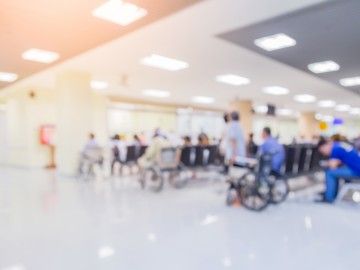
IWH links ER and workers’ comp claims data, finds important patterns in under-reporting
Over a third of work-related injuries and illnesses treated in Ontario hospital emergency rooms (ERs) don’t get reported as Workplace Safety and Insurance Board (WSIB) claims. That’s according to a recent Institute for Work & Health (IWH) data linkage study that found notable patterns in work-related injury reporting and under-reporting—including a change in reporting levels following the 2008/09 global financial crisis.

Registration now open for Spring 2022 session of Project ECHO OEM
Are you an Ontario primary health-care provider who treats or supports patients with injuries and illnesses that affect their ability to work? Project ECHO OEM is a telementoring program on occupational and environmental medicine set up just for you. Learn about best practices to better support patients in recovery and return to work or stay at work. Sessions are held via videoconference each Friday from April 22 to July 15, 2022. Registration is ongoing.
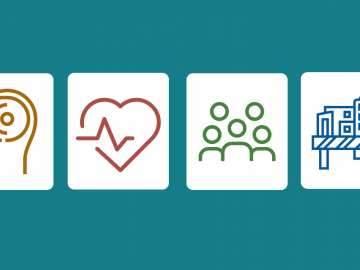
Participants needed to pilot-test a work support and accommodation planning tool
A research team at the Institute has developed a workplace support and accommodation planning tool for workers living with a chronic, episodic health condition. It’s designed to help workers think about the self-management strategies and workplace supports they need. The Job Demands and Accommodation Planning Tool is now ready to be pilot-tested in an evaluation study. If you work in Canada and are looking for support in managing your chronic, episodic health condition, you can help the team test the tool.
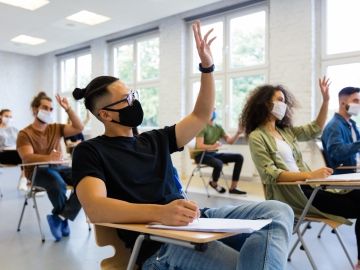
Syme Research Training Awards now open for applications
The Institute for Work & Health (IWH) is now accepting applications for its 12-month S. Leonard Syme Research Training Awards in Work and Health.
The awards are for young researchers at the master's or doctoral level intending to study work and health. Preference is given to candidates whose research interests closely align with IWH's current research and topic areas. IWH is particularly interested in candidates whose research addresses the prevention of work-related injury and illness, and the prevention and management of disability at work in Ontario. In the spirit of Dr. Syme's own contributions to research mentorship, candidates from any disciplinary background are eligible for training awards. A maximum of three smaller awards or one larger award may be offered. Awards are based on the merit of the research proposed.
The registration deadline for applications is April 29, 2022. Enquiries should be directed to Lyudmila Mansurova: lmansurova@iwh.on.ca.

What research can do: IWH safety culture tool used in WSIB’s Health and Safety Excellence program
A version of the IWH-Organizational Performance Metric (IWH-OPM) is used by Ontario’s Workplace Safety and Insurance Board (WSIB) to let workplaces in its Health and Safety Excellence Program measure their safety culture against a benchmark. The measure also allows the compensation agency to track trends in safety culture over time among participating organizations.

IWH Updates - Winter 2022
IWH researcher wins new WorkSafeBC postdoctoral award ~ IWH 2020-21 annual report now available ~ Participants needed to pilot-test a work support and accommodation planning tool ~ Registration now open for the Spring 2022 session of Project ECHO OEM

IWH study finds psychosocial work factors lead to burnout, not other way around
Studies to date have repeatedly shown a link between poor psychosocial work conditions and burnout. Some have also shown the link to potentially be a causal one. But if work can cause burnout, might burnout influence a person’s relationship to work? A new IWH study recently explored this question.

Q&A with new IWH president on how he got here and what he has planned for the years ahead
Almost 22 years ago, in the summer of 2000, master's student Peter Smith walked through the doors of the Institute for Work & Health for a 16-week practicum placement. Now, Dr. Peter Smith is president of the Institute, replacing Dr. Cameron Mustard, who retired in January after 20 years in the position. In a Q&A with At Work, Smith looks back at his history with the Institute and his vision for its future.

How workers and managers view workplace supports for depression
Many types of workplace practices and supports are available to help and accommodate workers with depression. But which do workers find most useful? Do their managers find the same? A study asks workers with lived experience of depression and the people who manage them, and finds rather divergent views.

Dr. Peter Smith named new IWH president
On Monday, January 17, IWH’s Dr. Peter Smith becomes the new president of IWH. Smith has been a member of IWH’s scientific staff for over 15 years, most recently serving as the Institute’s scientific co-director. He replaces Dr. Cameron Mustard, who is retiring after 20 years in the position. In a statement issued earlier this week, Kate Lamb, chair of the IWH Board of Directors, warmly thanked Mustard for his tremendous contribution
to the world of occupational health, safety and wellness. His impact as president is immeasurable, and his legacy will continue through his ongoing work with the Institute on active research projects,
wrote Lamb.

IWH 2020-21 annual report highlights Institute’s COVID-related research
Although we’re not yet out of the pandemic, we can begin to reflect on what workers and workplaces have been through, and what it means for the future of work. The IWH 2020-21 annual report, titled Taking Stock, describes the Institute’s research related to COVID-19 at the work-health interface. It also describes the Institute’s research into health, safety and disability issues that were important before the onset of COVID-19 and remain so today.

IWH Speaker Series: What the future of work looks like to young people with disabilities
What do young adults with disabilities think about when they weigh their job options and consider their career goals in the future of work? In an IWH Speaker Series presentation on December 14, Institute Scientist Dr. Arif Jetha shares findings from his study on this question. He also discusses the supports young adults with disabilities need to face the challenges of a changing labour market and take advantage of its potential opportunities.

Estimating the economic benefits of a fully inclusive Canada
Despite progress to date, persons with disabilities still face discrimination and other barriers to full participation in society. They have lower employment rates, lower earnings, lower education attainment, higher poverty rates and higher health-care use. What would be the economic benefits if these barriers were removed? An IWH study set out to estimate the economic benefits of a fully inclusive Canada.

What research can do: Scanning how OHS authorities responded to the pandemic
A policy briefing by IWH finds common challenges in the way labour inspection authorities in different jurisdictions addressed the pandemic. This was based on a questionnaire developed by the project team that was completed by leaders at 15 selected OHS authorities in North America, Europe, Asia and Australia.
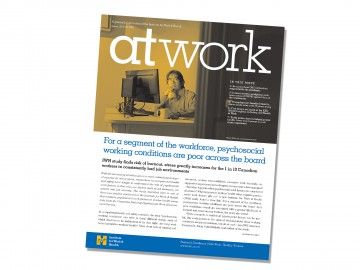
Get your Fall 2021 issue of At Work
The latest issue of At Work is now out. In it you'll find: a round-up of five takeaways from the XXII World Congress on Safety and Health at Work; summaries of our research on unemployment benefits and long-term death rates, psychosocial conditions and the link to burnout and stress; and findings from studies on COVID-19 spread at work, and the preventive measures workplaces had in place.

Burnout, stress risk increases greatly when psychosocial work conditions are bad overall
For one in 10 Canadian workers, the psychosocial work environment is poor across the board. They lack job security, have unmanageable workloads, receive little supervisor support, and so on. What’s more, their working conditions are associated with a substantial increase in risk of burnout and stress—seven and nine times greater risk, respectively, than among workers with good psychosocial working conditions. This is according to a new study by the Institute for Work & Health (IWH) and the Occupational Health Clinics for Ontario Workers (OHCOW).
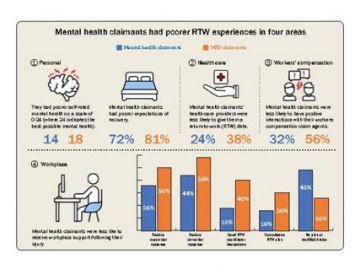
New infographic underlines key RTW differences between mental, physical injuries
Much of what we know about the return-to-work (RTW) process is based on workers’ compensation claims involving physical injuries. For people with mental health claims, the picture is very different. A new IWH infographic points out key disparities based on research conducted by the Institute.
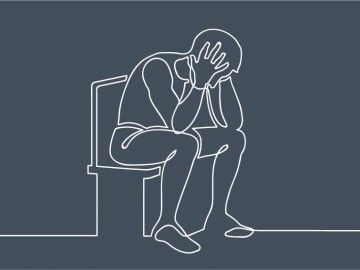
Webinar: Charting the long-term financial hit of having depression
How much of an impact can a depressive episode have on someone’s work earnings? IWH Associate Scientist Dr. Kathleen Dobson has conducted a study to answer this question. On November 9, she shares findings from her novel study in an IWH Speaker Series presentation.

Webinar: Understanding infection control practices and COVID spread at work
From the start of the COVID-19 pandemic, public health authorities recognized workplaces as a potential site of transmission. However, there remain large information gaps about workplace COVID-19 protection practices and COVID-19 spread at work. What types of infection control practices were in place at workplaces that continued to operate? How many cases of COVID-19 infection were transmitted at work? Find out on October 19, in an IWH Speaker Series by Dr. Peter Smith, who will share results from two studies conducted jointly with Public Health Ontario.
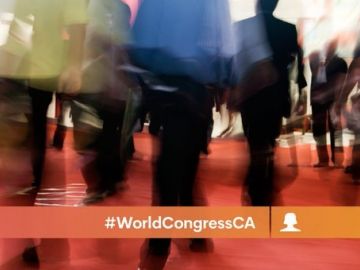
What’s connecting the global OHS community? Five things heard at the XXII World Congress on Safety and Health at Work
Future hazards, COVID lessons, a prevention mindset. From the many topics captivating the global occupational health and safety (OHS) community, here are five things we heard at the virtual XXII World Congress on Safety and Health at Work—an exhilarating four days of exchange and learning co-hosted by IWH on September 20-23.

New briefing looks at how OHS authorities responded to COVID-19
The COVID-19 pandemic has posed many challenges for individuals, communities and policy-makers, including how to reduce transmission of the virus in workplaces and prevent its spread from workplaces to the community. So how did occupational health and safety (OHS) authorities, regulators or inspectorates around the world respond to the challenge? A team of researchers led by IWH President Dr. Cameron Mustard conducted a survey of OHS authorities in developed countries. A new Issue Briefing sums up the themes they heard.

IWH Speaker Series presentation: the nature and extent of claim suppression in B.C.
A new IWH Speaker Series season is around the corner. To start off the season on Tuesday, September 28, presenters Dr. Ron Saunders, an adjunct scientist at IWH, and John O’Grady, a partner at Prism Economics and Analysis, share their research estimating the nature and extent of claim suppression in British Columbia. Find out more on the events page.

IWH Updates - Fall 2021
IWH welcomes new Board officers, members ~ IWH research associate promoted to associate scientist

IWH welcomes new Board officers, members
Kate Lamb, a lawyer and head of People and Client Services at the Law Society of Canada, has been elected Chair of the Institute for Work & Health (IWH)’s Board of Directors. Lamb takes over the position held for over six years by Kevin Wilson, a former Assistant Deputy Minister in the Ontario Ministry of Labour, Training and Skills Development. This was one of many changes made to the IWH Board membership at the Board’s September 2021 meeting, including the addition of three new Board members.
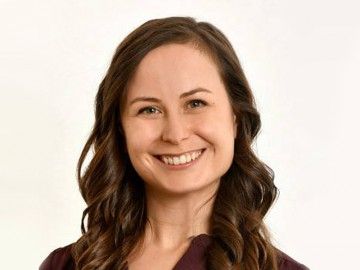
IWH research associate promoted to associate scientist
Congratulations to Dr. Kathleen Dobson, who has been promoted to associate scientist at the Institute. Dobson joined IWH in 2016 as research associate and currently holds a Syme fellowship in work and health. She’s completing her PhD in epidemiology at the University of Toronto’s Dalla Lana School of Public Health.